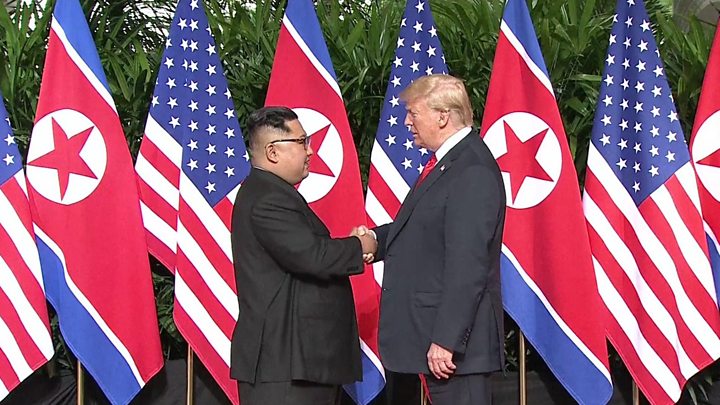Great expectations
June 12, 2018 | Expert Insights

The world’s gaze is on Singapore. A peace once thought impossible is being pursued in a tiny nation by two alpha male leaders who, a few months back, traded verbal blows that ignited fears of a war.
This will be the first time that a North Korean leader and a US President sit at the same table in history. The 9 a.m. meeting is scheduled to take place at the Capella Hotel on Sentosa Island off Singapore's mainland.
Background
There have been three previous diplomatic engagements between North Korea and the United States. Back in 1992, the Pyongyang regime faced the same isolation and intense economic pressure as it does today. In a diplomatic rapprochement, the two Koreas signed an agreement on the denuclearization of the Korean peninsula. That led to a meeting between American and Korean diplomats at the US mission in the United Nations. The second in 2005 led to a joint statement of principles and called for “the verifiable denuclearization of the Korean peninsula”. Finally, Kim Jong-Un struck the Leap Year agreement in 2012, where the regime undertook suspending nuclear and missile testing. In exchange, the Obama administration pledged to send food aid. All these deals fell apart.
Analysis
The upcoming summit between Kim Jong-Un and Donald Trump might set the pace for North Koreas future nuclear posture, as well as for the future of regional and US – Asia relations. Mr. Trump’s early departure from the G7 summit to reach Singapore has left traditional allies and world leaders with a bitter taste. However, there is no doubt about the fact that the US President is investing much of his personal credibility and that of Washington’s global power projection, in the negotiation with Pyongyang.
North Korea's state media said on Monday (June 11) that its leader Kim Jong-Un and United States President Donald Trump will discuss a "permanent and durable peace-keeping mechanism" on the Korean peninsula, denuclearization of the Korean peninsula, and other issues of mutual concern.
"Wide-ranging and profound views on the issue of establishing new DPRK-US relations, the issue of building a permanent and durable peace-keeping mechanism on the Korean peninsula, the issue of realizing the denuclearization of the Korean peninsula and other issues of mutual concern, as required by the changed era, will be exchanged at the DPRK-US summit talks," the Korean Central News Agency (KCNA) reported in English.
Mr Kim will be accompanied by his Foreign Minister Ri Yong Ho, Defense Minister No Kwang Chol and sister Ms Kim Yo Jong. Mr Trump will be joined by the US Secretary of State Mike Pompeo, Chief of Staff John Kelly, and National Security Advisor John Bolton. The working lunch will be attended by White House Press Secretary Sarah Sanders, and Ambassador Sung Kim, who has led substantive talks with the North going into the summit and Matt Pottinger, senior director for Asia on the White House National Security Council.
Both Washington and Pyongyang expressed optimism that the historic meeting between US President Donald Trump and North Korean dictator Kim Jong-Un would be a success. The South Korean President Moon Jae-In described it as the “summit of the century”.
Speaking the day before the Singapore summit, Mr Trump said: “We’ve got a very interesting meeting in particular tomorrow, I think things could work out very nicely.”
In another positive sign, North Korean media described the meeting as a chance to discuss peace and disarmament “as required by the changed era”.
Mr. Moon, who has played a pivotal role in bridging the gap between Pyongyang and the US, said Tuesday’s meeting would be a “historical milestone”, but cautioned that it would be the first stage in a “long process that may take one year, two years or even longer”.
Assessment
Our assessment is that both the leaders have invested much of their personal credibility in the summit and would like to see a positive outcome. However, we feel that the biggest obstacle in the past has not been in reaching an agreement but making it stick. This is not only because of North Korea seeking to circumvent deals it has made, but a recurrent problem of US administrations sending conflicting signals, as different factions vie for control of policymaking.








Comments